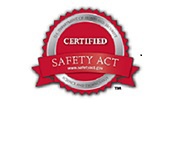Training Resources
Offered by government agencies, our Training Resources page provides a list of resources where First Responders can obtain training on a wide range of topics including but not limited to bioterrorism, emergency preparedness, and suicide prevention.
Bioterrorism Training and Education
The Centers for Disease Control offers training resources related specifically to bioterrorism agents, including anthrax, botulism, plagues, smallpox, viral hemorrhagic fevers and more.
Bureau of Justice Assistance National Training and Technical Assistance Center
The mission of BJA is to provide policy leadership and assistance that supports criminal justice systems in the effort to achieve safer communities. Established in 2008, the BJA National Training and Technical Assistance Center (NTTAC) promotes that mission by serving as a major source of justice-related training and technical assistance (TTA) information and resources to improve criminal justice systems nationwide.
Center for Domestic Preparedness
FEMA’s Center for Domestic Preparedness (CDP), located in Anniston, Alabama, is the United States Department of Homeland Security (DHS)'s only federally chartered Weapons of Mass Destruction (WMD) training center.
Centers for Public Health Preparedness
Since 2000, schools of public health have played an essential role in reaching and teaching the public health preparedness workforce through research, education and training. SPH collaborate with governmental and non-governmental agencies to prepare for and respond to all hazards events including bioterrorism, emerging infectious diseases, and environmental threats.
Chemical Emergency Information for First Responders
Guidelines from the Centers for Disease Control for local responders providing help in chemical emergencies, including initial responses to letters, packages, or containers containing suspicious powders, liquids, or other materials, medical management, ER procedures, and managing hazardous materials.
Department of Homeland Security Automated Critical Asset Management System
The Automated Critical Asset Management System (ACAMS) is a Web-enabled information services portal with tools and resources that help state and local governments, including law enforcement, public safety and emergency response personnel, build critical infrastructure/key resource (CIKR) protection programs in their local jurisdictions.
Disaster Information Specialization
The National Library of Medicine Disaster Information Management Research Center have developed a “Disaster Information Specialization” composed of a Basic and Advanced level courses. The online continuing education courses are free to anyone in the disaster response or information professions.
DHS Training and Exercise
Various training and exercise programs offered throughout DHS.
Emergency Preparedness for All Hazards and Guidebook
The Centers for Disease Control provides resources that are intended to help professionals take an all-hazards approach to emergency preparedness.
Emergency Preparedness for Natural Disasters and Severe Weather
The Centers for Disease Control provides tools, trainings, and education in response, cleanup and safety that are intended to help professionals in natural disaster occurrences, including earthquakes, extreme heat and cold, floods, hurricanes, tornadoes, wildfires and more.
Emergency Use Authorization Training
An online course developed by the Food and Drug Administration and Centers for Disease Control and Prevention.
FEMA Emergency Management Institute Course Listings
FEMA Emergency Management Institute Courses and Schedules.
First Responder Training
FirstResponderTraining.gov serves as a central access point to validated, G&T-approved Weapons of Mass Destruction (WMD) training and information for First Responder disciplines.
Homeland Security Exercise and Evaluation Program
The Homeland Security Exercise and Evaluation Program is a capabilities and performance-based exercise program that provides a standardized policy, methodology, and language for designing, developing, conducting, and evaluating all exercises.
Hydrogen Safety for First Responders
Introduction to Hydrogen Safety for First Responders from the Department of Energy is a Web-based course that provides an awareness level overview of hydrogen for fire, law enforcement, and emergency medical personnel. This multimedia tutorial acquaints first responders with hydrogen, its basic properties, and how it compares to other familiar fuels.
Improvised Explosive Device Awareness Training
This training will provide the participants a comprehensive overview of IEDs. The course will include IED anatomy, types, response guidelines, and history.
International Association of Fire Fighters
The IAFF encourages its members to continuously build their skills and knowledge in their roles as fire fighters, paramedics and union leaders.
Lessons Learned Information Sharing
The national network of Lessons Learned and Best Practices for emergency response providers and homeland security officials. LLIS.gov, a secure, restricted-access information resource is designed to facilitate efforts to prevent, prepare for and respond to acts of of terrorism and other incidents across all disciplines and communities throughout the US.
Mass Casualty Event Preparedness and Response
The Centers for Disease Control provides tools, trainings, and education in both preparedness and response that are intended to help professionals in mass casualty occurrences.
National Center for Forensic Scientists
Upcoming Training Opportunities of Interest to the Forensic Science, Law Enforcement, and Public Safety Communities.
National Counterterrorism Center
The National Counterterrorism Center (NCTC) was established by Presidential Executive Order 13354 in August 2004, and codified by the Intelligence Reform and Terrorism Prevention Act of 2004 (IRTPA).
National Disaster Preparedness Training Center
The NDPTC at the University of Hawaii provides high quality disaster training to ensure that island communities throughout the Pacific are ready and able to respond, recover, and reconstruct after catastrophes.
National Domestic Preparedness Consortium
The NDPC is a DHS training partner providing high-quality training to emergency responders throughout the United States and its territories under NDPC's Homeland Security National Training Cooperative Agreement.
National Exercise Program
Our goal is to help states, cities, towns and villages gain an objective assessment of their capacity to prevent or respond to and recover from a disaster so that modifications or improvements can be made before a real incident occurs.
National Fire Academy Education and Training
USFA for NFA Students and Instructors.
National Preparedness Directorate National Training and Education
The National Preparedness Directorate (NPD) online Course Catalog provides searchable, integrated information on courses provided or managed by FEMA’s Center for Domestic Preparedness (CDP), Emergency Management Institute (EMI), and National Training and Education Division (NTED).
Radiological and Nuclear Terrorism Mass Casualty Training
Online course from the Centers for Disease Control and Prevention designed to teach physicians and nurses how to respond locally to mass casualties with potential radiological injury.
Ready.gov Campaign
The Ready Campaign asks individuals to do three key things to prepare for the unexpected: get an emergency supply kit, make a family emergency plan, and be informed about the different types of emergencies that could occur and their appropriate responses.
Suicide Prevention Resources for First Responders
The National Institute of Mental Health provides information on the role of first responders in preventing suicide, helping suicide attempters, helping suicide survivors and helping yourself and fellow first responders.
SUIDS and SIDS Resources for First Responders
Information for first responders on handling sudden unexpected infant death (SUID). The site includes a discussion of the roles of emergency medical technicians (EMTs), firefighters, emergency-room personnel, and coroners/medical examiners who investigate and determine cause of death.
Terrorism and Preparedness Data Resource Center
External Data Resources related to Terrorism and Preparedness
The Energetic Materials Research and Testing Center
The Energetic Materials Research and Testing Center (EMRTC) at New Mexico Tech (NMT) is the consortium’s lead partner for explosives, live explosives, and incendiary devices training.
The National Center for Biomedical Research and Training
The National Center for Biomedical Research and Training (NCBRT), Academy of Counter-Terrorist Education at Louisiana State University (LSU) provides courses that deal with Weapons of Mass Destruction (WMD), counter-terrorism, and high consequence events, for all disciplines including emergency management, law enforcement (including tactical operations), HazMat teams, public health, EMS, hospital, agricultural, and others.
The National Emergency Response and Rescue Training Center
The NERRTC's mission is to design, develop, and deliver training, exercises, and technical assistance for the nation's emergency responders.
The U.S. Department of Energy’s National Nuclear Security Administration
NNSA/NSO provides weapons of mass destruction (WMD) training to teach first responders to detect, prepare for, prevent, respond to, and recover from terrorist acts through research, development, test and evaluation, training, and intelligence support activities.
Transportation Technology Center, Incorporated
The TCCI offers advanced first responder training to government and private sectors in heavy freight operation, along with a new emphasis on security issues, passenger rail and infrastructure integrity research.
 Official website of the Department of Homeland Security
Official website of the Department of Homeland Security
















